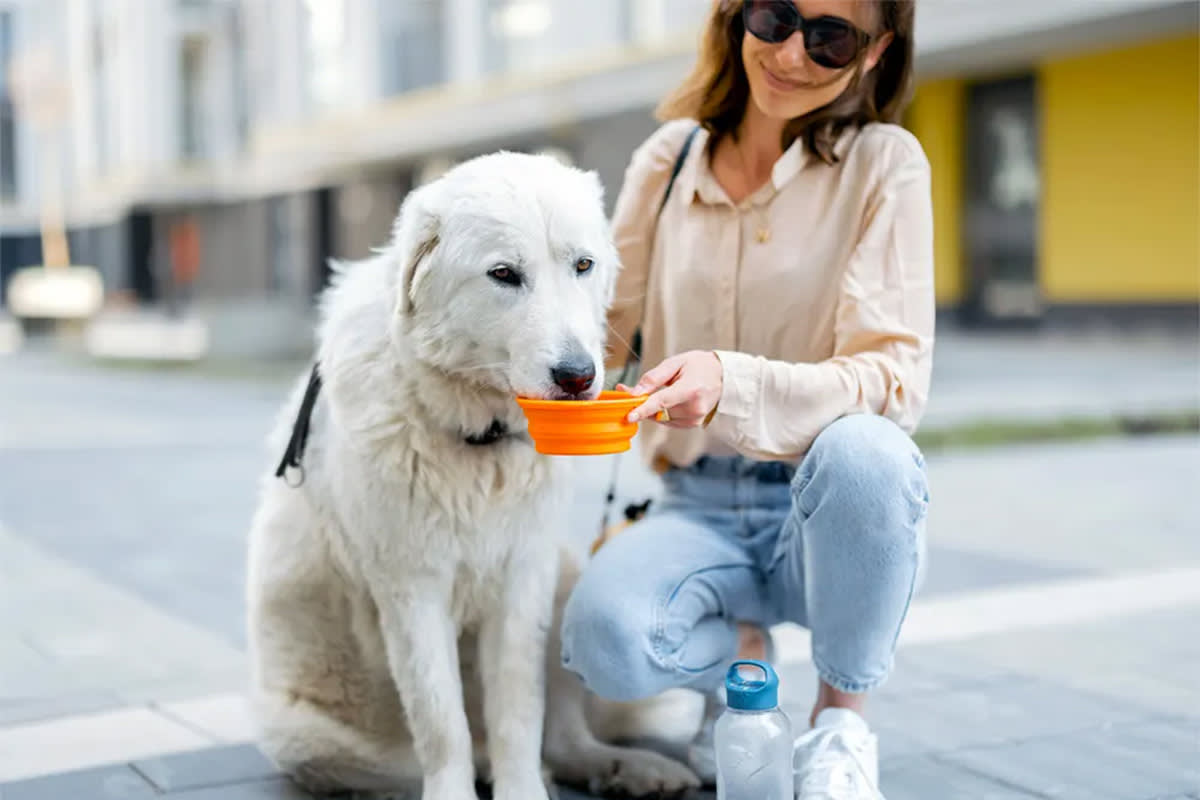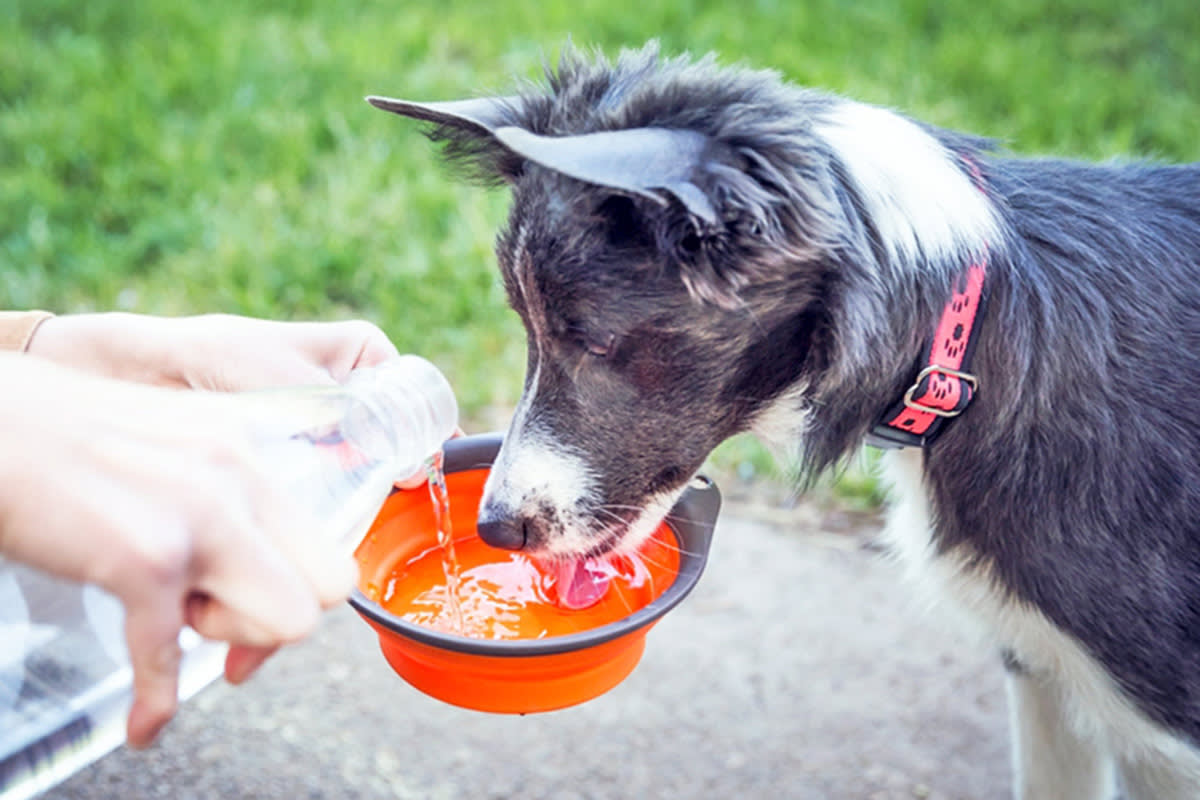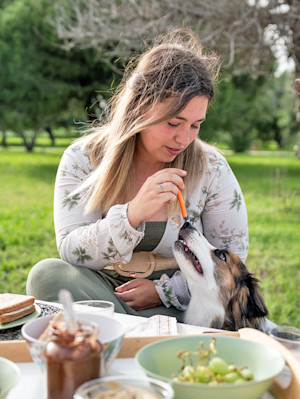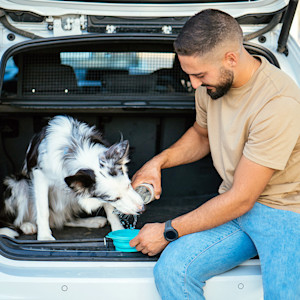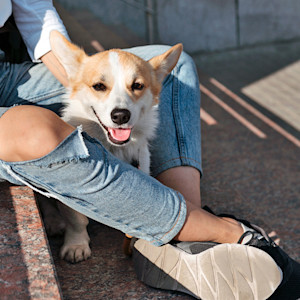Should Your Dog Be Drinking Electrolytes?
Sometimes you just need a Gatorade.

Share Article
In the human world, electrolyte supplements come in handy for all sorts of situations. They can help us recover after a hard workout, refresh on hot days, and regulate our fluid balance while sick. (If I’ve got the flu, you better believe I’ll be cradling my emotional support Gatorade.) An egg, bacon, and cheese bagel sandwich and Pedialyte combo may have been your go-to after the more particularly wild nights of your 20s.
But what about our dogs? Did Air Bud ever secretly crave a nice, cool sports drink? And for that matter, is it even healthy for dogs to take electrolytes?
Just like in humans, electrolytes are vital for our dogs’ health. And according to two veterinary experts who spoke with Kinship, electrolyte supplements can be helpful for dogs facing specific health issues. At the same time, it’s important to confirm they’re actually needed. In some cases, unnecessary electrolytes can do more harm than good.
“Balanced electrolytes are very important,” says Dr. Jerry Klein, veterinary consultant for Corey’s Canine Corner. “In fact, balanced electrolytes are essential for life.” At the same time, he says, this is not a “wing it” situation. “If you are giving electrolytes on a regular basis, you should consult your veterinarian.”

Do dogs need electrolyte supplements?
Need might be a strong word. At least, usually.
According to Dr. W. Chris Hummel, a veterinarian at Lovet Pet Health Care, electrolytes aren’t necessarily bad for dogs on occasion, but under normal circumstances, healthy dogs won’t need them. Instead, dogs might take elective electrolyte supplements like Gatorade and Pedialyte to support them through medical situations like diarrhea or illness.
Still, it doesn’t surprise Dr. Hummel that we humans might think our dogs could use a post-workout pick-me-up. “People make a lot of translations between humans and other species, and sometimes it works really well,” he says. “Sometimes, it doesn't work so well. Sometimes it’s just neither here nor there. Electrolytes kind of fall into this category.”
On that note, fun fact: Exercise might actually not be the best time to give your dog electrolytes. Dogs don’t sweat like we do, Dr. Hummel explains; instead, they release heat by panting, which means their bodies mostly lose pure water. “They're already actually high on their electrolytes when they're in an exercise, heat-induced state,” Dr. Hummel says. “Using a normal sports drink is actually going to potentially throw them even more concentrated. We want to give them more water than we do electrolytes under those circumstances.”
What kinds of electrolytes can dogs take?
It’s usually safe for our pups to consume small portions of human electrolyte fluids like Gatorade, Pedialyte, and Powerade. Make sure to check the ingredients list for artificial sweeteners like xylitol opens in new tab and sucralose, and when in doubt, consult your vet to ensure the formula is safe. They might also recommend a solution specially formulated for dogs.
“If your veterinarian does recommend supplemental electrolytes for your dog,” Dr. Klein says, “you may want to ask about mixing the electrolyte with water to improve hydration.” That’s especially true for the human products, which are often high in sugar.
When should you give your dog electrolyte supplements?
According to Dr. Klein, rescue dogs, military dogs, sled dogs, and other highly active pooches might take supplemental electrolytes after “prolonged, strenuous work.” But if your dog needs electrolytes, they’re more likely dealing with a specific medical issue, like dehydration, diarrhea, surgery recovery, or a more serious illness. In these cases, the symptoms of your dog’s specific condition could be your first clue that they could use electrolytes.
Early signs of ailment can include:
Shaky muscles
Dropped gait and other signs of muscle weakness
Dogs living with specific medical conditions can also benefit from supplemental electrolytes. For example, Dr. Hummel says that dogs with kidney issues lose more electrolytes in their urine than average. “We just have to be very selective about which electrolytes we}re giving and make sure we're not giving too much,” he says. “We want to watch dogs’ sodium intake as well as their potassium intake, because those can actually complicate kidney disease to a certain extent.”
One situation where Dr. Hummel does not recommend electrolyte fluids? When your dog is vomiting. “You can actually make them more dehydrated by giving them something orally,” he says. “It makes them vomit more. They lose even more electrolytes, even more water. You're exacerbating the problem.”
When to see a vet
Don’t wait. If you’re considering supplemental electrolytes, especially on a long-term basis, ask an expert to help you determine if your dog needs them and make a plan to support their long-term health.
“It’s important that the dog have the proper balance of electrolytes,” Dr. Klein says. “For that reason, dog owners should not be giving electrolytes to their dog unless it is under the direction of their veterinarian.”
Being proactive is key. Dr. Hummel notes that the 2025 Lovet Pet Health Care survey recently found that though 95 percent of dog parents feel anxious when their pets seem ill, 88 percent do not seek regular preventative care. “A lot of people wait and see,” Dr. Hummel says, “and if you wait too long for something like an electrolyte disturbance, especially, you can get the dog into pretty serious shape that could have been prevented by stepping in a little earlier.”
Yet one more reason that in this case, it’s always wise to call the vet.

Laura Bradley
Laura is a New York-based experienced writer and mom of two rescue pups. Her work has appeared in Slate, Vanity Fair, Daily Beast, The Washington Post, The Atlantic, Yahoo! News, Vulture, Grazia Magazine, and more. When she is not writing or walking the pooches, you will probably find her in the community garden.
Related articles
Everything You Actually Need When You Get a New Dog
All the things you’ll want on hand as a new pet parent, from the must-haves to the nice-to-haves.
![Woman feeding her dog a carrot outside.]()
8 Best Human Foods for Dogs
Delicious, nutritious, and safe? Sign them up.
![Man giving his dog some water in the trunk of his car.]()
Here’s How Much Water Your Dog Should Drink in a Day, According to Experts
A veterinarian weighs in with some definitive answers.
Why Isn’t Your Dog Drinking Water?
An unsettling puzzle to solve.
![Cute corgi dog panting outside in the sun.]()
8 Warning Signs of Dehydration in Dogs
It can range from fixable to super-serious. Here’s what you need to know.
Why Does Your Dog’s Pee Smell So Bad?
Ummm, ew.
